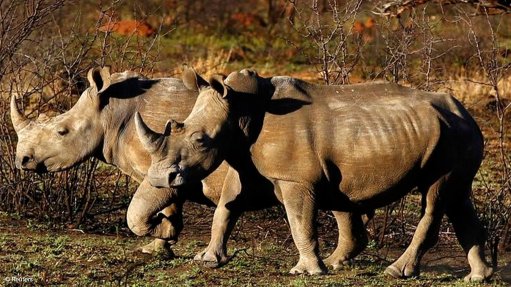
Photo by: Reuters
South Africa, where 79% of the world’s rhinos live, said it aims to come up with a plan by the end of 2030 to dismantle an almost half-century ban on trading the endangered animals’ horns.
The proposal, contained in a draft of the country’s first rhino biodiversity-management plan released late Tuesday, is controversial because poaching of the animals for their horns has decimated their populations across Africa. The horns are ground into powder and sold in east Asia where they are falsely believed to cure cancer and other ailments.
The country’s environment department will prepare a proposal for a resumption in trade to submit to the national cabinet for approval. It will depend on criteria related to the sustainability of rhino populations. That proposal would then be taken to a meeting of the Convention on International Trade in Endangered Species of Wild Flora and Fauna, under which the trade has been banned since 1977.
The aim of the plan is that “conditions are met for legal international trade in rhino horn from protected wild rhinoceros, for conservation purposes, to be promoted,” the department said.
South Africa has argued in the past that legalising the trade would bring down the price of rhino horn, which at times has exceeded that of gold, and encourage the allocation of both government-owned and private land for wildlife conservation because it would generate revenue. Critics have said legalising the trade would see even more of the animals killed.
Despite the illegal killing of more than 10 000 of the animals in South Africa since 2008, the number of southern white rhinos across Africa has risen to about 16 000 from just 50 in the early 1900s. Of those, 81% live in South Africa.
The continental population of black rhinos — a smaller species — slumped to 2 500 in 1992 from around 60 000 in the 1960. That number has since almost tripled to about 6 500, of which about a third live in South Africa.
While about 500 rhinos are poached annually in South Africa, that has declined from more than 1 000 a year between 2013 and 2017.
Criteria for monitoring progress in meeting the conditions needed to argue for lifting the trade ban will be set by March next year, the department said.
The biodiversity-management plan is now open for public comment for 30 days.